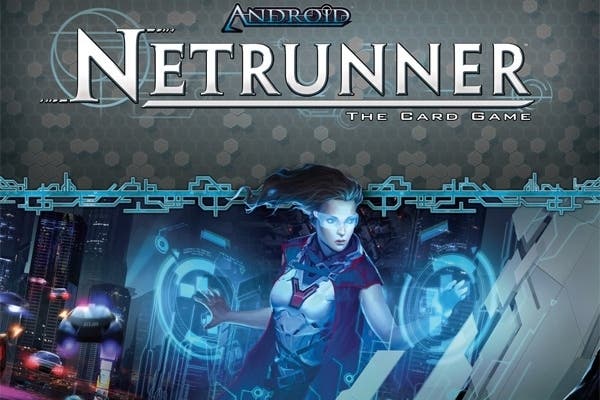Android: Netrunner review
The most fun you can have with your power off.
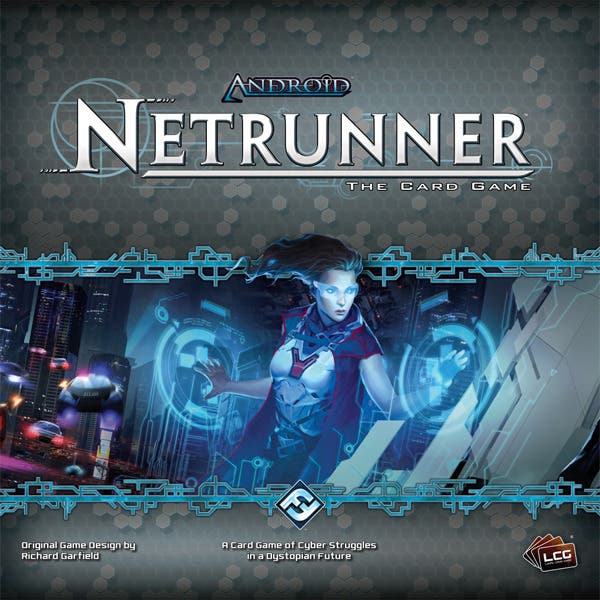
Price: £35 / Players: 2 / Time: 45 minutes
I once had a friend who was into Magic: The Gathering describe its appeal to me. "I want to sit down with someone, shake his hand, and take him apart." This statement was just red-blooded enough for me to freeze, my bottle of beer failing to complete its journey to my lips.
There's a gravity to collectible card games, one heavy enough to have dragged countless video games into their orbit. Following Minecraft, Mojang declared it was working on its own CCG, Scrolls. Japanese RPGs often feature collectible cards, and there are legions of card games attempting to wring money from mobile devices that make up with enthusiasm for what they lack in... well, any redeeming features whatsoever.
I'm here to tell you that while video games are still trying to get CCGs right, you should try the real thing. These days, I'm playing the frankly astounding Android: Netrunner, which is really two games - neither of which are games at all, but badass contests.
Netrunner is a game of controlling a glittering, Blade Runner-like corporation. Across turns as heavy as money, you're spending time units known as "Clicks" to build a digital fortress. Click. You invest in a hedge fund, doubling your credits. Click. You begin developing a project in a new private server, placing it face down. Click. You quietly deploy an Intrusion Countermeasure, or "Ice", to protect it, one capable of inflicting vegetative brain damage. Every turn, you're physically claiming more and more table space.
And who's the chancer sat opposite you? It's the hacker player.
Because Netrunner is also a game of controlling the lone individual who fights these corporations. With cards as paltry as blackmailing employees and staying up all night, the hacker has to reduce the corp player, with their billions, skyscrapers and bomb-proof bunkers, to something as small and hateful as a mistake. Who doesn't love the idea of jinking past a priceless security system? But it's not just Netrunner's theme that awes. Mechanically, it's every bit as slick.
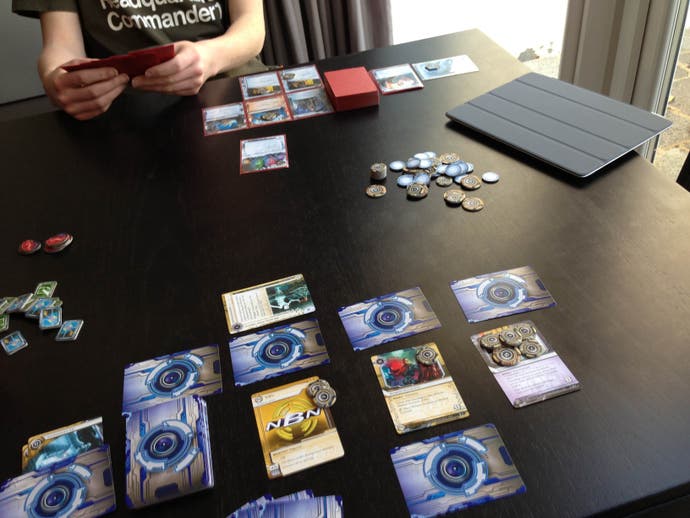
Sequestered in the corporation's deck are a number of agenda cards: concepts they want to develop until they're financially viable. The corp scores these cards by playing them into the open and advancing them to completion, granting themselves horrific bonuses like a personal police force. The runner just has to access them, at which point they slip into their scoring pile effortlessly. First side to 7 points wins.
Now, here's the clever part. The advantage the corp has is secrecy. Netrunner was actually developed by Richard Garfield, the man behind Magic: The Gathering, in an attempt to create a game that was more skill-based and "like poker". At this (as at everything else), it's a huge success.
Most of the corp's turn is spent installing assets and agendas, or installing Ice and upgrades on top of these. The twist is that everything is played face down, and it's only the instant that these become relevant - the runner discovering that a server is being run by code maestro Akitaro Watanabe, say - that the corp pays to "rez" them, flipping them face up. Which means the corp is playing a shell game, trying to coax the hacker into calling in every favour to blitz through wall after wall of Ice to access a worthless advertising campaign.
But the hacker has a similarly joyous advantage. They're not just restricted to running on these little internet fiefdoms. The hacker can announce runs on the corporation's R&D, archives or HQ; in other words, the corp player's deck, their discard pile or even their hand. If Netrunner is summed up by a single moment, it's when you're playing the corp and draw a whole suite of agendas into your hand, knowing there's nowhere you can hide them.
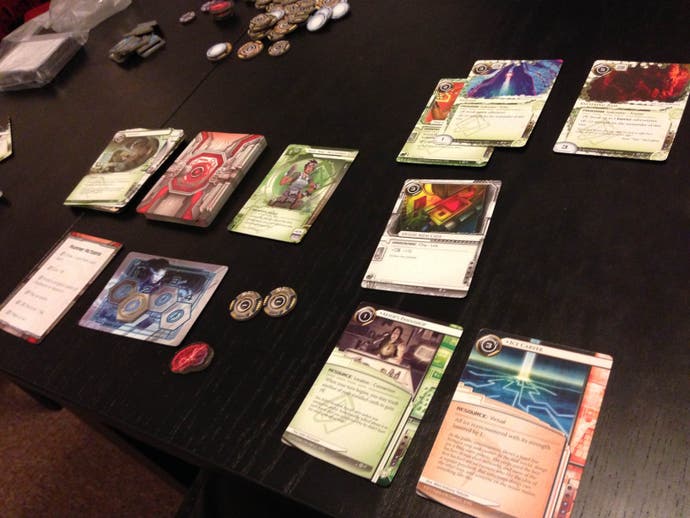
Knitting both of these twists together is the rule that whenever the corp's hand overflows, cards are discarded to their archives face down, leading to hilarious game-winning moments where the hacker finds schematics for robot brains in the bin.
The end result is a game defined by an inescapable tension. Playing as either side, you'll always feel you're about to lose, because while you can make grim estimates of how far you are from victory, the other player could win at any point. Worse, even the most lovingly crafted deck will often feel like a second antagonist. Both sides need programs, yes, and events and resources, but you'll need money for all of that, and so sitting down to play Netrunner absolutely feels like you've taken a seat under a sword of Damocles that you've fastened there yourself.
Will your deck give you what you need? ...no. What about next turn? ...no. Which is where cards like Special Order come in, where the hacker shells out for a courier for that program they desperately need, and inevitably find out it's the next card they would have drawn.
In other words, Netrunner is simply a huge amount of fun. It's just a wonderful game. And that, I think, is all that a lot of gamers have been waiting for in a CCG. You could honestly have a great time just with Netrunner's starter set, with its 252 cards - but I doubt you'll want to.
One of Android: Netrunner's bigger hooks, as far as collectibility goes, are the factions, a huge addition to Netrunner's original release back in the 90s (when it tanked in a saturated CCG market). In this game of tough decisions, by far the toughest is who you want to play.
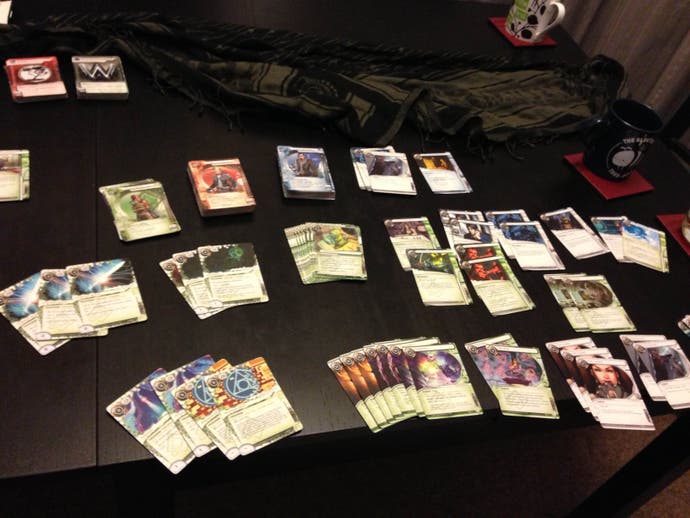
As a runner, you could go Shaper: the fascinated enthusiasts who live in the code and don't smash through Ice so much as laughingly push it aside. The coolest card yet released for them is Notoriety. Perform a hack on archives, HQ and R&D in a single turn and play it as an agenda point, with a picture of a girl leaning back and enjoying a cigarette. Ice cold. Or you could go Criminal, performing bank jobs and selling agendas on the black market, with their consoles that spiral one hack into another one.
But you won't, will you? No. You'll go Anarch. Stumbling from the club to the doctor who installs a modem in your spine, to a devastating run where your viruses make scorched earth of the corp's most expensive server. Doesn't that sound like fun?
Which leaves the choice of your corp deck. The dark dealings and expensive assassinations of Weylend Consortium, amassing Bad Publicity tokens that fund the runner's crimes. Or if you can bluff (I can't bluff) you could try Jinteki biomedical, quietly hiding Fetal AIs in a warren of deadly traps.
Most players will probably gravitate towards the laughably brutal Ice of Haas-Bioroid, who make cybernetics. Me? I went NBN, Netrunner's very own News Corp., whose comparatively tame Ice and connections are dedicated to simply finding out exactly where the runner is and piling on tag tokens. Which is fine! Don't worry about it. Tag tokens don't even do anything. That is, until the corp begins closing your bank accounts. Killing your friends. Dropping that doomsday card that levels your entire city block.
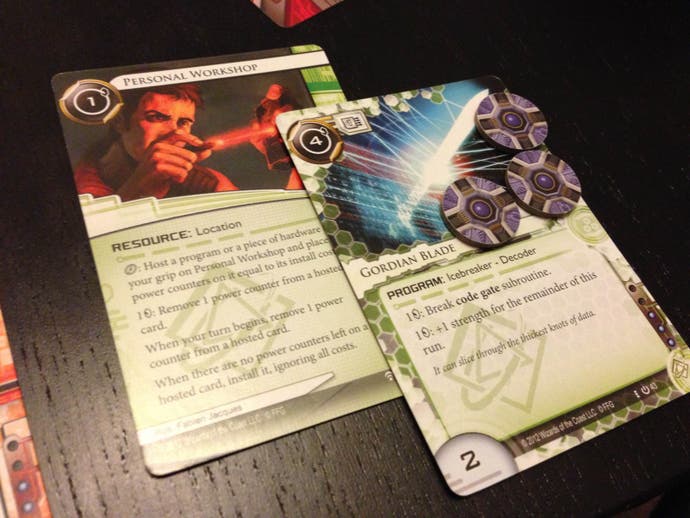
I was expecting to enjoy Netrunner, but I wasn't expecting to love building (well, tweaking, mostly) the decks as much as I am. A big part of that is that it uses Fantasy Flight's Living Card Game model. You don't pay for random boosters and premade decks, but little expansion packs, released once a month. At the time of writing, four such packs have come out, and every one feels like an entirely manageable addition to the game, growing it gently.
But the real appeal of making your deck is that it's a puzzle. It's not an arcane art, with a hundred cards that basically do the same thing. Netrunner has three kinds of Ice. Three kinds of programs that break them. And you just have to protect the agendas. Make sure it works. Go!
Now imagine doing that sat cross-legged on your floor, with your deck splayed out in front of you. Trying to refine it. Then imagine finding that you've got 56 cards when really you want the minimum 45, to maximise reliability. Removing every one of those hand-chosen cards hurts like you're taking them out of your own body. Suddenly, you're emotionally invested in your deck and seeing how it performs.
All of which leads to a card game that's imaginative, gripping, colourful and only a little complicated.
Within card games, about Netrunner's only flaw is that as machines, both hacker and corp decks will sometimes simply fail to start, silently wrecking all this day-after-tomorrow colour by acting like a crap car on a cold day as you fail to get the right program, or suffer a slow, agonising defeat because all of your economy or agenda cards happened to be hiding at the bottom of your stack.
Beyond that is the simple problem that you're going to need friends to play it with. Like a MOBA, Netrunner is best experienced when friends take it up and start learning together. But I bet you can force through that.
"It's me," you tell your friend.
"What? Why didn't I recognise your number?"
"I'm calling from a payphone," you'll tell them, popping the collar of your trenchcoat against the cold. "It's the only way to be safe.
"I've got something to show you, but there's no time to explain. Meet me at my safehouse at 1900 hours tonight. Bring your phone with the Tron Legacy soundtrack on it. And £30 for the starter kit I've bought you."
Then you'll hang up, and step out among the ominous glass towers of London or Leeds or Bickleshire. Your battle for cyberspace is about to begin.
Quintin is the editor of Shut Up & Sit Down, a board game review site. Visit it for more coverage of this strange cardboard realm.
